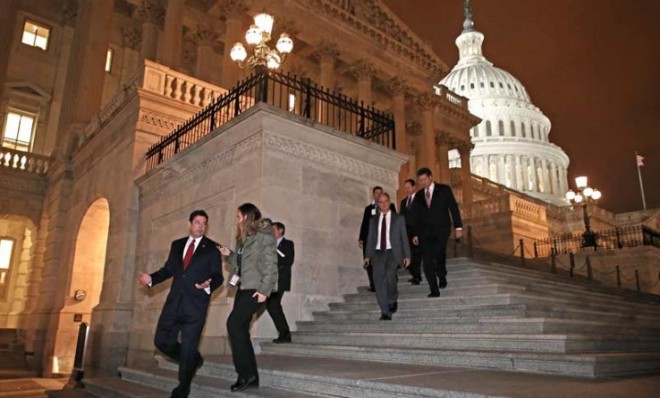The new normal for politics
No incentive to compromise


A free daily email with the biggest news stories of the day – and the best features from TheWeek.com
You are now subscribed
Your newsletter sign-up was successful
It's fashionable to bash House Republicans these days as no-knowing Tea-Party-controlled rubes who are responsible for the destruction of the Grand Old Party. But who is responsible for the House Republicans? Proximately, the Tea Party movement and the intellectual/corporate forces behind it can take some credit for establishing a defensive weapon inside Congress that makes it very hard to compromise. But ultimately, both the Democratic and Republican parties are responsible for the strategy that has so polarized this chamber of Congress in the first place. Redistricting is controlled by state legislatures, and the same Republicans who are now grumbling that the House GOP is throwing away the baby with the bath water were the ones who encouraged conservative donors to focus on state legislative chambers and on electing politicians who were keen to redraw districts in ways that corralled conservative constituencies.
At the same time, the idea that partisan redistricting alone is responsible for the make-up of the House Republican conference is ridiculous. It's like looking at the yellow in a Van Gogh painting and concluding that the painting is about the color yellow. These GOPers were elected in fair elections over the course of several cycles culminating in 2010, a year when the Democratic Party simply couldn't turn out its voters in marginal districts. These members were elected to impose fiscal discipline the Republican way. That's what they're there for. The voices of these constituencies are decidedly anti-spending and anti-establishment: The talk radio hosts and activist websites that have proliferated. The most well-funded election pressure groups are those with a keen focus on fiscal discipline, like the Club for Growth. These folks feel put-over, put-upon, screwed by their leadership and still really, really, really dislike President Obama.
So, this is the New Normal: The big fights will be about money. House Republicans, regardless of who they elect speaker, will represent the sum of the forces that elected them. That's a lot like the Old Normal.
The Week
Escape your echo chamber. Get the facts behind the news, plus analysis from multiple perspectives.

Sign up for The Week's Free Newsletters
From our morning news briefing to a weekly Good News Newsletter, get the best of The Week delivered directly to your inbox.
From our morning news briefing to a weekly Good News Newsletter, get the best of The Week delivered directly to your inbox.
A free daily email with the biggest news stories of the day – and the best features from TheWeek.com
Marc Ambinder is TheWeek.com's editor-at-large. He is the author, with D.B. Grady, of The Command and Deep State: Inside the Government Secrecy Industry. Marc is also a contributing editor for The Atlantic and GQ. Formerly, he served as White House correspondent for National Journal, chief political consultant for CBS News, and politics editor at The Atlantic. Marc is a 2001 graduate of Harvard. He is married to Michael Park, a corporate strategy consultant, and lives in Los Angeles.
